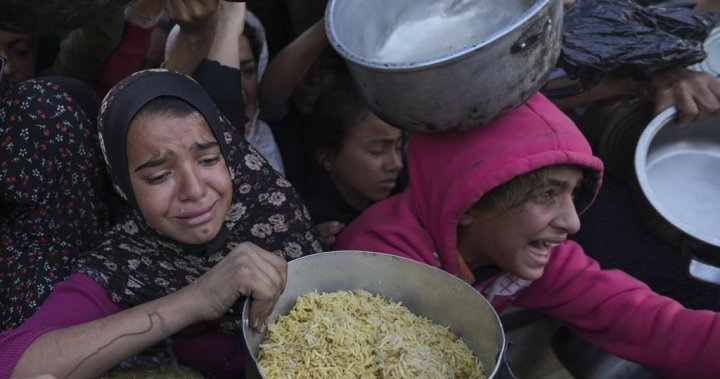A fourth infant died of hypothermia in the Gaza Strip, where hundreds of thousands of Palestinians displaced by the war that has been going on for about 15 months live in tents along the rainy and windy coast with the arrival of winter.
His father, Yahya, said that the 20-day-old child, Jumaa Al-Batran, was found with his head “cold as ice” when his parents woke up on Sunday. The child’s twin brother, Ali, was transferred to the intensive care department at Al-Aqsa Martyrs Hospital.
Their father said that the twins were born one month premature and spent only one day in the hospital’s nursery, which, like other health centers in Gaza, is suffering from severe pressure and is only partially functioning.
He said that paramedics asked their mother to keep the newborns warm, but that was impossible because they live in a tent and temperatures regularly drop below 10 degrees Celsius at night.
“We are eight people, and we only have four blankets,” the patriarch said, hugging his son’s pale body. He described the dew drops seeping through the tent cover throughout the night. “Look at its color because of the cold. Do you see how frozen it is?”
Children, some barefoot, stood outside and watched him cry. The shrouded infant was placed at the imam’s feet, barely larger than his shoes. After praying, the imam took off his ankle-length coat and wrapped it around the father.
“I feel warm, brother,” he said.
At least three more children have died from the cold in recent weeks, according to local health officials.
A Palestinian woman was killed in her home in the West Bank
A Palestinian woman was shot dead in her home in the restive West Bank city of Jenin, where the Palestinian Authority this month launched a rare crackdown on activists.
The family of Shatha Al-Sabagh, a 22-year-old journalism student, said she was killed by a Palestinian security forces sniper on Saturday evening while she was with her mother and two children. They added that there were no armed men in the area at that time.
A statement issued by Palestinian security forces said they were fired upon by “outlaws” – the term used to refer to local militants fighting Israeli forces. Security forces condemned the shooting and pledged to investigate it.
An Israeli air strike kills 5 television journalists in a “targeted manner” in Nuseirat, Gaza.
The Western-backed Palestinian Authority exercises limited self-rule in parts of the West Bank occupied by Israel. It is unpopular among Palestinians, largely because of its cooperation with Israel on security matters, even as Israel accuses it of incitement and generally turning a blind eye to extremism.
Get daily national news
Get the day’s top political, economic and current affairs news, headlines, delivered to your inbox once a day.
In a statement, the Sabbagh family accused the Palestinian security services of becoming “oppressive tools that practice terrorism against their people instead of protecting their dignity and standing up to the (Israeli) occupation.”
Hamas accused the security forces, and indicated that Al-Sabbagh is the sister of one of its fighters who was killed during fighting with Israeli forces last year.
Later Sunday, hundreds demonstrated in Jenin in support of Palestinian security forces, organized by the Fatah movement that dominates the Palestinian Authority.
Violence has erupted in the West Bank since a Hamas attack on October 7, 2023 from Gaza led to the outbreak of war there. Israel occupied the West Bank, Gaza and East Jerusalem in the 1967 Middle East war. The Palestinians want the three territories for their future state.
An Israeli report details the attack on hostages held in Gaza
The attack on October 7 led to the killing of about 1,200 people, most of them civilians, and the kidnapping of about 250, including women, children, and the elderly. About 100 hostages remain inside Gaza, and at least a third of them are believed to be dead.
The Israeli Ministry of Health issued a report late on Saturday detailing what it said were widespread physical, psychological and sexual assaults on people detained in Gaza.
The report, based on findings by doctors who treated some of more than 100 hostages released during last year’s ceasefire, said the captives – including children – were subjected to “severe physical and sexual abuse such as beatings, isolation and food deprivation.” Water, branding, hair pulling, and sexual assault.
The findings, which will be sent to the United Nations, could increase pressure on Israeli Prime Minister Benjamin Netanyahu to agree to a ceasefire and hostage release with Hamas. The hostages’ families and supporters have held mass demonstrations for months, and diplomats have reported recent progress in the long-running indirect talks.
A bombing on a hospital in Gaza City kills 7 people
An Israeli raid on the top floor of Al-Wafa Hospital in Gaza City on Sunday killed at least seven people and injured several others, according to Civil Defense, the Hamas-run government’s first responders. The Israeli army said it struck a Hamas observation post inside the building, which it said was no longer used as a hospital.
A raid near Nuseirat in central Gaza resulted in the killing of eight people and the injury of more than 15 others, according to Al Awda Hospital officials.
Meanwhile, the Israeli military said that militants fired five shells from northern Gaza into Israel, the second time in two days, adding that two were intercepted and the rest likely landed in open areas. The Sderot municipality said that three people were slightly injured on their way to shelters. Rocket launches from northern Gaza have been rare in recent months as the Israeli army intensifies its operations there.
The Israeli attack led to the death of more than 45,000 Palestinians, according to local health authorities. They say that women and children constitute more than half of the deaths, but they do not distinguish between militants and civilians in their statistics. Israel says it killed more than 17,000 militants without providing evidence.
Israeli bombing and ground operations have displaced about 90 percent of Gaza’s population of 2.3 million, often several times. Large areas, including entire neighbourhoods, are in ruins, and vital infrastructure has been destroyed.
Israeli restrictions, fighting and the breakdown of law and order have hampered the delivery of humanitarian aid, raising fears of famine, while hunger has made people more vulnerable to disease and death.




